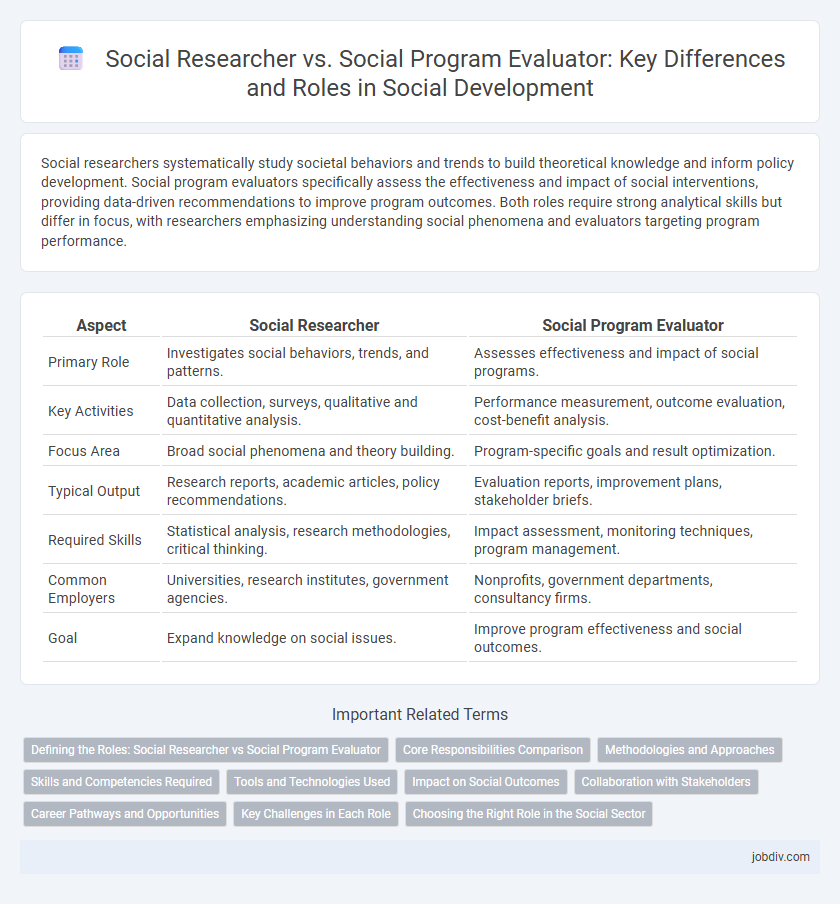Social researchers systematically study societal behaviors and trends to build theoretical knowledge and inform policy development. Social program evaluators specifically assess the effectiveness and impact of social interventions, providing data-driven recommendations to improve program outcomes. Both roles require strong analytical skills but differ in focus, with researchers emphasizing understanding social phenomena and evaluators targeting program performance.
Table of Comparison
| Aspect | Social Researcher | Social Program Evaluator |
|---|---|---|
| Primary Role | Investigates social behaviors, trends, and patterns. | Assesses effectiveness and impact of social programs. |
| Key Activities | Data collection, surveys, qualitative and quantitative analysis. | Performance measurement, outcome evaluation, cost-benefit analysis. |
| Focus Area | Broad social phenomena and theory building. | Program-specific goals and result optimization. |
| Typical Output | Research reports, academic articles, policy recommendations. | Evaluation reports, improvement plans, stakeholder briefs. |
| Required Skills | Statistical analysis, research methodologies, critical thinking. | Impact assessment, monitoring techniques, program management. |
| Common Employers | Universities, research institutes, government agencies. | Nonprofits, government departments, consultancy firms. |
| Goal | Expand knowledge on social issues. | Improve program effectiveness and social outcomes. |
Defining the Roles: Social Researcher vs Social Program Evaluator
A Social Researcher systematically investigates social phenomena through qualitative and quantitative methodologies to generate new knowledge and theoretical insights. A Social Program Evaluator assesses the effectiveness and impact of specific social initiatives, using data-driven analysis to inform program improvements and policy decisions. Both roles utilize empirical data but differ in focus: researchers aim to understand social behavior broadly, while evaluators concentrate on measuring program outcomes.
Core Responsibilities Comparison
Social Researchers primarily focus on designing studies, collecting qualitative and quantitative data, and analyzing social behaviors and trends to generate theoretical insights. Social Program Evaluators assess the effectiveness, efficiency, and impact of social interventions by using metrics aligned with program goals and stakeholder requirements. Both roles require strong data analysis skills, but Social Program Evaluators emphasize outcome measurement and reporting to inform policy and funding decisions.
Methodologies and Approaches
Social Researchers primarily utilize qualitative and quantitative methodologies such as surveys, interviews, and ethnographic studies to explore social phenomena and generate new knowledge. Social Program Evaluators focus on outcome-based approaches, including logic models, randomized control trials, and cost-benefit analysis, to assess the effectiveness and impact of specific social programs. Both roles emphasize data collection and analysis, but Social Program Evaluators prioritize evaluation frameworks that measure program success and inform policy decisions.
Skills and Competencies Required
Social Researchers require strong analytical skills, proficiency in qualitative and quantitative research methods, and expertise in data collection and statistical analysis to understand social behaviors and trends. Social Program Evaluators need competencies in program design assessment, outcome measurement, and proficiency in logic models and evaluation frameworks to determine the effectiveness and impact of social interventions. Both roles demand critical thinking, communication skills, and the ability to synthesize complex information for policy recommendations and program improvements.
Tools and Technologies Used
Social researchers utilize statistical software like SPSS, R, and NVivo for data collection, processing, and qualitative analysis, enabling in-depth sociological insights. Social program evaluators employ logic models, performance metrics, and evaluation software such as Tableau and SAS to assess program effectiveness and impact. Both roles rely on survey tools like Qualtrics and data visualization platforms to translate complex data into actionable conclusions.
Impact on Social Outcomes
Social researchers analyze data to understand social behaviors and trends, providing evidence-based insights that inform policy and program development. Social program evaluators assess the effectiveness of specific interventions, measuring outcomes to determine program success and areas for improvement. Both roles critically influence social outcomes by shaping strategies grounded in empirical evidence and real-world impact assessments.
Collaboration with Stakeholders
Social researchers collaborate closely with stakeholders to design studies that capture diverse perspectives and ensure relevant data collection tailored to community needs. Social program evaluators engage stakeholders throughout the evaluation process to validate outcomes, refine program implementation, and foster shared ownership of results. This collaborative approach enhances the accuracy, credibility, and practical impact of social research and program evaluations.
Career Pathways and Opportunities
Social researchers primarily focus on designing studies and collecting data to understand social phenomena, often working in academia, government agencies, or think tanks. Social program evaluators analyze the effectiveness and impact of social initiatives, utilizing skills in data analysis and performance measurement to inform policy and funding decisions within nonprofits, government, and consulting firms. Career pathways for social researchers often lead to advanced research roles or academic positions, while social program evaluators may advance toward senior evaluation roles, program management, or policy advisory positions.
Key Challenges in Each Role
Social researchers face key challenges such as designing unbiased studies that accurately capture complex social behaviors and ensuring ethical standards while managing diverse populations. Social program evaluators encounter difficulties in measuring program impact objectively, overcoming data limitations, and translating findings into actionable policy recommendations. Both roles require strong analytical skills, but social researchers emphasize theory development, whereas evaluators prioritize practical outcomes and stakeholder communication.
Choosing the Right Role in the Social Sector
Social researchers primarily focus on designing studies, collecting data, and analyzing social phenomena to generate insights that inform theory and policy. Social program evaluators specialize in assessing the effectiveness and impact of social interventions, using quantitative and qualitative methods to guide program improvements and funding decisions. Selecting the right role depends on whether the emphasis is on advancing social knowledge or directly improving program outcomes in community settings.
Social Researcher vs Social Program Evaluator Infographic

 jobdiv.com
jobdiv.com